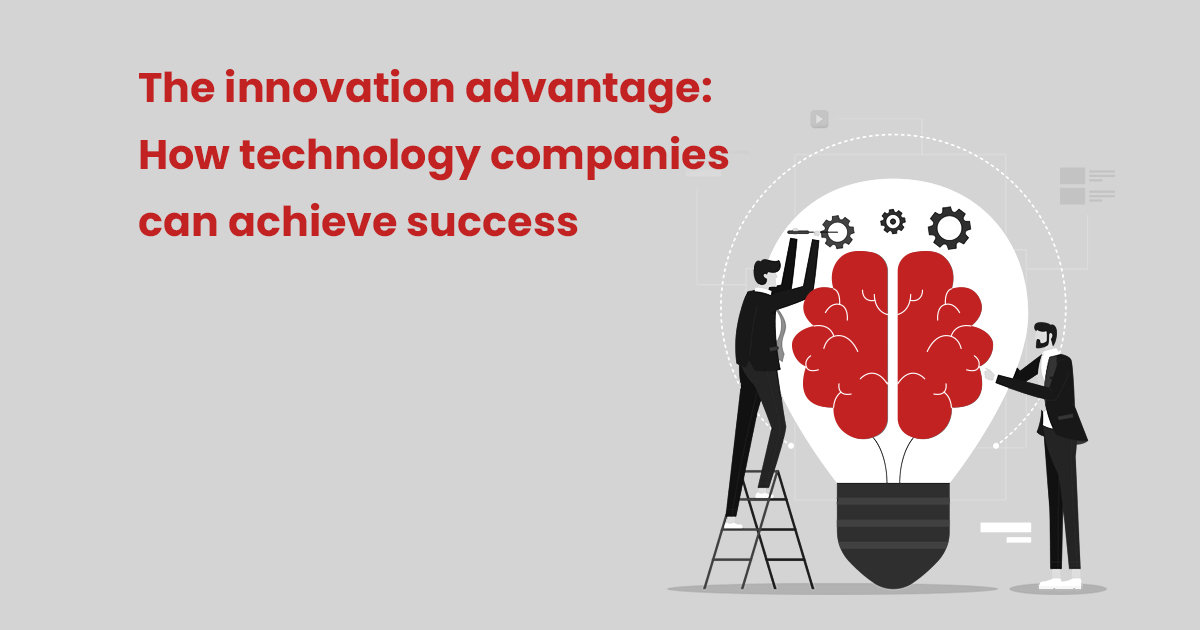As the technology industry is becoming highly competitive, companies must establish innovation practices with innovation strategies and a clear roadmap to achieve success. Without innovation, companies risk falling behind the competition and becoming irrelevant in the marketplace.
Game-changing technologies like AI, cloud and 5G have hit the tipping points for mass adoption. As per Gartner, by 2025, 51% of IT spending in the application software, infrastructure software, business process services and system infrastructure markets will have shifted from traditional solutions to the public cloud.
Thus, with the right innovation strategies, a technology company can improve sales & customer relationships, reduce costs, and boost market position.
Innovation as a Differentiator to Stand Out in the Market
Innovation allows technology companies to differentiate themselves from the competition by creating new and unique products and services to address customer needs and pain points. By continuously innovating, companies can stay ahead of the curve and maintain competitive edge.
Innovation strategy helps identify new business models, enter new markets, and create new revenue streams. For example, cloud technologies & software-as-a-service (SaaS) business models have enabled technology companies to create new ways of delivering software and services. It has disrupted the traditional IT products & services business and has created new market opportunities.
Companies that prioritise innovation in business strategy and invest in research and development will not only accelerate revenue growth in the short term but are more likely to succeed in the long term.
Focus on Customer Needs
Customer needs should always drive innovation. Technology companies should focus on listening to customer feedback, conducting user research, and leveraging data analytics to gain insights into customer behaviour. It will ensure that the products and services provide real value to their customers. Companies that ignore customer needs risk creating solutions that do not address fundamental problems or meet changing customer expectations, leading to a loss of market share.
Aim for Continuous Innovation
Innovation isn’t a single event, but a continuous process wherein companies must always look for an innovation strategy for IT to improve their products and services.
For instance, Amazon continuously invests in research and development, exploring new technologies to improve their products and services, such as their smart speaker, Amazon Echo. Additionally, they have introduced new solutions such as Amazon Prime, a subscription-based service that provides customers with fast and free shipping, streaming of movies and music, and exclusive access to deals.
By continuously innovating, Amazon has established itself as a leader in the e-commerce and technology industries and continues to meet its customers’ changing needs and preferences. As a result, it accelerates revenue growth in the short-term and promotes success in the long term, too.
Embrace Adoptive Innovation
Adaptive innovation is crucial for technology companies to stay relevant and competitive. By adopting emerging technologies, converging them with existing ones, and integrating them into their products or services, companies can offer new solutions that improve operational efficiencies, reduce costs, and enhance customer satisfaction.
For instance, IBM has successfully integrated AI and machine learning into their products and services to provide customers with personalized experiences, automate routine tasks, and improve decision-making processes. Using innovation strategies for a technology company is the key to success in a highly competitive marketplace.
Foster a Culture of Innovation
Fostering a culture of innovation requires companies to provide resources and support for innovation, such as creating dedicated R&D teams and innovation labs. Encouraging creativity, experimentation, and risk-taking helps employees proceed with new approaches and take calculated risks.
With innovation consulting, tech companies can create an environment wherein employees feel empowered to share ideas and unleash their creative potential.
Google encourages creativity and experimentation by providing its employees with various resources and support for innovation. For instance, they have created innovation labs where employees can collaborate on new projects and experiment with emerging technologies. Google's "20% time" policy, which allows employees to work on their passion projects for 20% of their workweek, has resulted in the creation of products like Gmail and Google News.
Leverage to Attract and Retain Talent
Companies developing an innovation culture become talent magnets. They can attract top talent passionate about working on the latest and greatest innovations and cutting-edge technologies. These employees are more likely to stay with the company and be more productive, contributing to the company's success in the long term.
For instance, Tesla's innovative culture has helped them retain its employees, who are invested in its mission to accelerate the world's transition to sustainable energy.
Innovation consulting is critical for tech companies to achieve long-term success and generate sustainable revenue. By embracing innovation strategies, your business can create an innovative roadmap, identify new opportunities and drive success.
InUnison offers innovation strategy for IT companies to help and support your journey in a highly digitalised and tech-savvy world.

